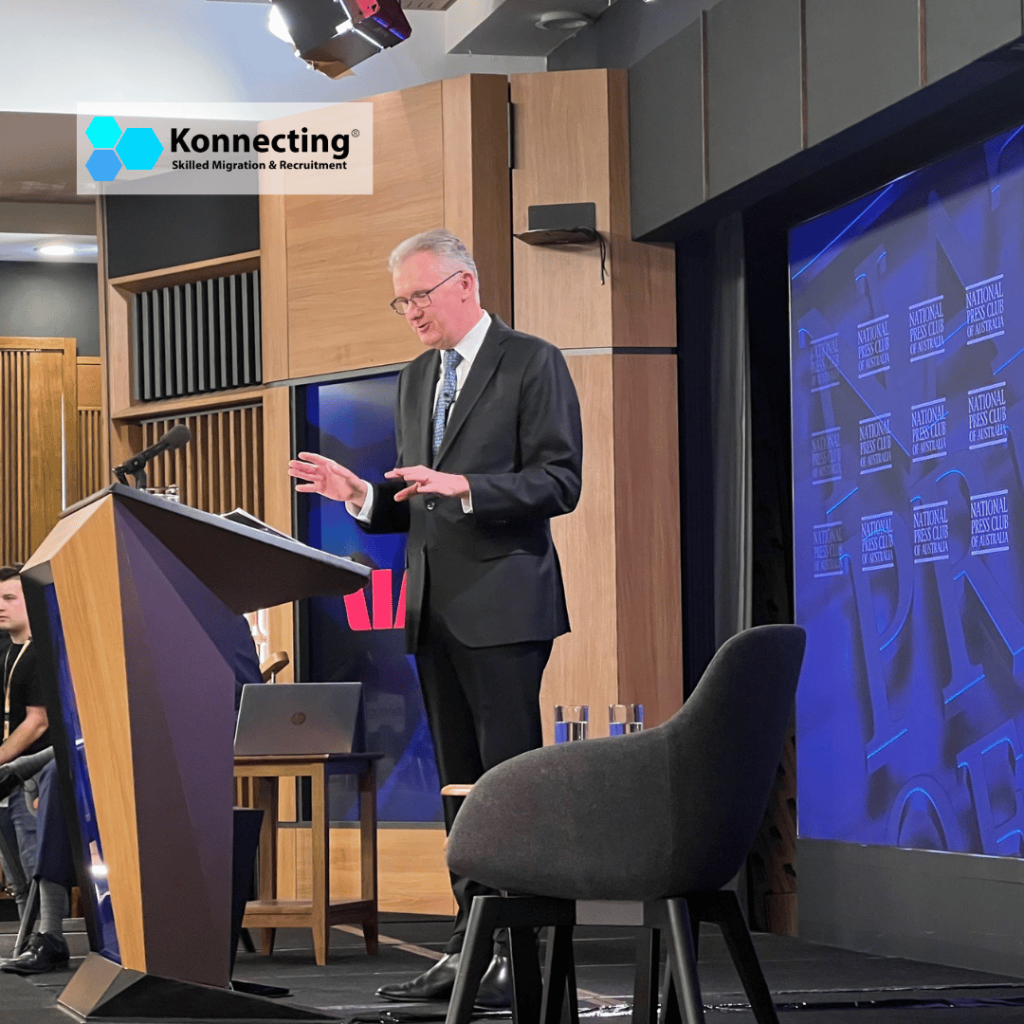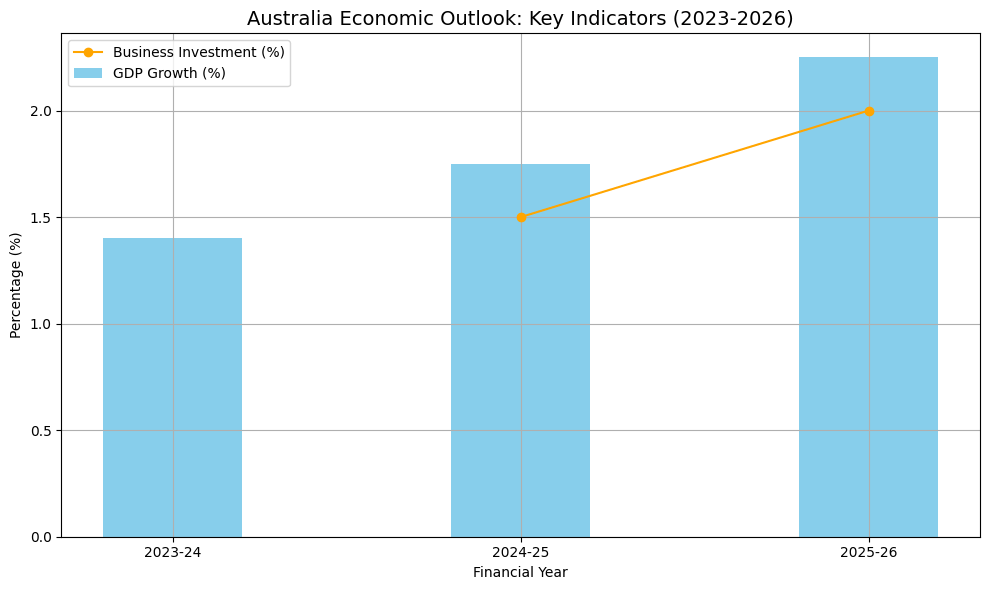Navigating Australia’s Reliance on Foreign Students: Three Compelling Reasons Why Breaking Free Is Challenging
-
Agriculture
-
All Agriculture
Select sub classifications-
Agricultural Technician
-
Fisheries Officer
-
Meat Inspector
-
Quarantine Officer
-
Primary Products Inspector Nec
-
Aquaculture Farmer
-
Cotton Grower
-
Flower Grower
-
Fruit or Nut Grower
-
Grain, Oilseed or Pasture Grower
-
Grape Grower
-
Mixed Crop Farmer
-
Sugar Cane Grower
-
Turf Grower
-
Vegetable Grower
-
Crop Farmers nec
-
Apiarist
-
Beef Cattle Farmer
-
Dairy Cattle Farmer
-
Deer Farmer
-
Goat Farmer
-
Horse Breeder
-
Mixed Livestock Farmer
-
Pig Farmer
-
Poultry Farmer
-
Sheep Farmer
-
Livestock Farmer nec
-
Mixed Crop and Livestock Farmer
-
Hunter Trapper
-
Pest Controller
-
Farm, Forestry and Garden Workers Nec
-
Wine Maker
-
Food Technologist
-
Agricultural Engineer
-
Agriculture Consultant
-
Forester
-
Biomedical Engineer
-
Production Manager (Forestry)
-
Shearer
-
Veterinary Nurse
-
Wool Buyer
-
Florist
-
Gardener (General)
-
Arborist
-
Landscape Gardener
-
Greenkeeper
-
Nurseryperson
-
Dog Trainer or Handler
-
Horse Trainer
-
Pet Groomer
-
Zookeeper
-
Animal Attendants and Trainers (nec)
-
Agricultural and Horticultural Mobile Plant Operator
-
Logging Plant Operator
-
Conservation Officer
-
Environmental Consultant
-
Environmental Research Scientist
-
Park Ranger
-
Environmental Scientists (nec)
-
Automotive Heavy Mechanic (Agricultural)
-
-
Automotive
-
All Automotive
Select sub classifications-
Automotive Electrician
-
Motor Vehicle Parts and Accessories Fitter
-
Motor Vehicle or Caravan Salesperson
-
Panelbeater
-
Motor Vehicle Parts Interpreter
-
Vehicle Body Builder
-
Vehicle Trimmer
-
Vehicle Painter
-
Motor Mechanic (General)
-
Diesel Motor Mechanic
-
Motorcycle Mechanic
-
Small Engine Mechanic
-
Workshop/Service Centre Manager
-
Workshop Manager/Leading Hand
-
Fleet Manager
-
Railway Station Manager
-
Transport Company Manager
-
Others
-
-
Engineering
-
All Engineering
Select sub classifications-
Engineering Manager
-
Chemical Engineer
-
Materials Engineer
-
Civil Engineer
-
Geotechnical Engineer
-
Quantity Surveyor
-
Structural Engineer
-
Transport Engineer
-
Electrical Engineer
-
Electronics Engineer
-
Industrial Engineer
-
Mechanical Engineer
-
Production or Plant Engineer
-
Mining Engineer (excluding Petroleum)
-
Petroleum engineer
-
Aeronautical Engineer
-
Agricultural Engineer
-
Biomedical Engineer
-
Engineering Technologist
-
Environmental Engineer
-
Naval Architect
-
Engineering Professionals (nec)
-
Telecommunications Engineer
-
Telecommunications Network Engineer
-
Civil Engineering Technician
-
Civil Engineering Draftsperson
-
Electrical Engineering Technician
-
Electrical Engineering Draftsperson
-
Electronic Engineering Technician
-
Electronic Engineering Draftsperson
-
Mechanical Engineering Technician
-
Mechanical Engineering Draftsperson
-
Telecommunications Field Engineer
-
Telecommunications Network Planner
-
Telecommunications Technical Officer or Technologist
-
Architectural Draftsperson
-
Building Associate
-
Building Inspector
-
Construction Estimator
-
Plumbing Inspector
-
Surveying or Spatial Science Technician
-
Architectural, Building & Surveying Technicians (nec)
-
Safety Inspector
-
Maintenance Planner
-
Metallurgical or Materials Technician
-
Mine Deputy
-
Building and Engineering Technicians nec
-
Aeroplane Pilot
-
Air Traffic Controller
-
Flying Instructor
-
Helicopter Pilot
-
Air Transport Professionals nec
-
Master Fisher
-
Ship's Engineer
-
Ship's Master
-
Ship's Officer
-
Ship's Surveyor
-
Marine Transport Professionals nec
-
Architect
-
Landscape Architect
-
Surveyor
-
Cartographer
-
Other Spatial Scientist
-
Industrial Designer
-
Urban and Regional Planner
-
Software Engineer
-
Computer Network & Systems Engineer
-
ICT Quality Assurance Engineer
-
ICT Support Engineer
-
ICT Systems Test Engineer
-
ICT Support and Test Engineers (nec)
-
Aircraft Maintenance Engineer (Avionics)
-
Aircraft Maintenance Engineer (Mechanical)
-
Aircraft Maintenance Engineer (Structures)
-
Others
-
-
Healthcare & Medical
-
All Healthcare & Medical
Select sub classifications-
Registered Nurse (Aged Care)
-
Registered Nurse (Child & Family Health)
-
Registered Nurse (Community Health)
-
Registered Nurse (Critical Care & Emergency)
-
Registered Nurse (Developmental Disability)
-
Registered Nurse (Disability & Rehabilitation)
-
Registered Nurse (Medical)
-
Registered Nurse (Medical Practice)
-
Registered Nurse (Mental Health)
-
Registered Nurse (Perioperative)
-
Registered Nurse (Surgical)
-
Registered Nurse (Paediatrics)
-
Registered Nurses (nec)
-
MIDWIFE
-
Nurse Practitioner
-
General Practitioner
-
Resident Medical Officer
-
Anaesthetist
-
Specialist Physician (General Medicine)
-
Cardiologist
-
Clinical Haematologist
-
Medical Oncologist
-
Endocrinologist
-
Gastroenterologist
-
Intensive Care Specialist
-
Neurologist
-
Paediatrician
-
Renal Medicine Specialist
-
Rheumatologist
-
Thoracic Medicine Specialist
-
Specialist Physicians nec
-
Psychiatrist
-
Surgeon (General)
-
Cardiothoracic Surgeon
-
Neurosurgeon
-
Orthopaedic Surgeon
-
Otorhinolaryngologist
-
Paediatric Surgeon
-
Plastic and Reconstructive Surgeon
-
Urologist
-
Vascular Surgeon
-
Dermatologist
-
Emergency Medicine Specialist
-
Obstetrician and Gynaecologist
-
Ophthalmologist
-
Pathologist
-
Diagnostic and Interventional Radiologist
-
Radiation Oncologist
-
Medical Practitioners nec
-
Medical Diagnostic Radiographer
-
Medical Radiation Therapist
-
Nuclear Medicine Technologist
-
Sonographer
-
Optometrist
-
ORTHOPTIST
-
Dietitians
-
Environmental Health Officer
-
Occupational Health and Safety Adviser
-
Hospital Pharmacist
-
Industrial Pharmacist
-
Retail Pharmacist
-
Health Promotion Officer
-
Orthotist or Prosthetist
-
Health Diagnostic and Promotion Professionals nec
-
Chiropractors
-
Osteopaths
-
Acupuncturist
-
Homeopath
-
Naturopath
-
Traditional Chinese Medicine Practitioner
-
Complementary Health Therapist nec
-
Dental Specialist
-
Dentist
-
Occupational Therapist
-
Physiotherapist
-
Podiatrist
-
Audiologist
-
Speech Pathologist
-
Nurse Educator
-
Nurse Researcher
-
Nurse Manager
-
Medical Administrator
-
Nursing Clinical Director
-
Primary Health Organisation Manager
-
Welfare Centre Manager
-
Health And Welfare Services Managers (nec)
-
Enrolled Nurse
-
Mothercraft Nurse
-
Ambulance Officer
-
Intensive Care Ambulance Paramedic
-
Dental Hygienist
-
Dental Prosthetist
-
Dental Technician
-
Dental Therapist
-
Diversional Therapist
-
Aboriginal and Torres Strait Island Health Worker
-
Massage Therapist
-
Community Worker
-
Disabilities Services Officer
-
Family Support Worker
-
Parole or Probation Officer
-
Residential Care Officer
-
Youth Worker
-
Anaesthetic Technician
-
Cardiac Technician
-
Medical Laboratory Technician
-
Operating Theatre Technician
-
PHARMACY TECHNICIAN
-
Pathology Collector
-
Medical Technicians (nec)
-
Other
-
-
IT
-
All IT
Select sub classifications-
Chief Information Officer
-
ICT Project Manager***
-
ICT Managers (nec)
-
ICT Trainer
-
ICT Business Analyst
-
Systems Analyst
-
Multimedia Specialist
-
Web Developer***
-
Analyst Programmer
-
Developer / Programmer
-
Software Engineer
-
Software Tester
-
Software & Applications Programmers (nec)
-
Database Administrator
-
ICT Security Specialist
-
Systems Administrator
-
Computer Network & Systems Engineer
-
Network Administrator
-
Network Analyst
-
ICT Quality Assurance Engineer
-
ICT Support Engineer
-
ICT Systems Test Engineer
-
ICT Support and Test Engineers (nec)
-
Web Administrator
-
ICT Account Manager
-
ICT Business Development Manager
-
ICT Sales Representative
-
Multimedia Designer
-
Graphic Designer
-
Illustrator
-
Web Designer
-
Other
-
-
Scientific
-
All Scientific
Select sub classifications-
Conservation Officer
-
Environmental Consultant
-
Environmental Research Scientist
-
Park Ranger
-
Environmental Scientists (nec)
-
Anatomist or Physiologist
-
Biochemist
-
Biotechnologist
-
Botanist
-
Marine Biologist
-
Microbiologist
-
Zoologist
-
Life scientists (nec)
-
Life scientist (General)
-
Chemistry Technician
-
Earth Science Technician
-
Life Science Technician
-
School Laboratory Technician
-
Science Technicians (nec)
-
Medical Laboratory Scientist
-
Chemist
-
Food Technologist
-
Wine Maker
-
Geologist
-
Geophysicist
-
Agriculture Scientist
-
Chemical Engineer
-
Laboratory Manager
-
Natural and Physical Science Professionals nec
-
Nutritionist
-
Pathology Collector
-
Quality Assurance Manager
-
Sales Representative - Medical and Pharmaceutical
-
Veterinarian
-
Others
-
Hospital Pharmacist
-
Industrial Pharmacist
-
Retail Pharmacist
-
-
Trade
-
All Trade
Select sub classifications-
Airconditioning and Mechanical Services Plumber
-
Airconditioning and Refrigeration Mechanic
-
Aircraft Maintenance Engineer (Avionics)
-
Aircraft Maintenance Engineer (Mechanical)
-
Aircraft Maintenance Engineer (Structures)
-
Apparel Cutter
-
Baker
-
Pastrycook
-
Blacksmith
-
Boat Builder and Repairer
-
Bricklayer
-
Broadcast Transmitter Operator
-
Business Machine Mechanic
-
Butchers and Smallgoods Maker
-
Cabinetmaker
-
Cabler (Data and Telecommunications)
-
Camera Operator (Film, Television or Video)
-
Canvas Goods Fabricator
-
Carpenter
-
Carpenter and Joiner
-
Chef
-
Chemical Plant Operator
-
Clothing Trades Worker (nec)
-
Clothing Patternmaker
-
Communications Operator
-
Cook
-
Drainer
-
Dressmaker or Tailor
-
Electrical Linesworker
-
Electrician (General)
-
Electrician (Special Class)
-
Electronic Equipment Trades Worker
-
Electronic Instrument Trades Worker (General)
-
Electronic Instrument Trades Worker (Special Class)
-
Electroplater
-
Engineering Patternmaker
-
Engraver
-
Farrier
-
Fibrous Plasterer
-
Fire Protection Equipment Technician
-
Fitter (General)
-
Fitter and Turner
-
Fitter-Welder
-
Floor Finisher
-
Furniture Finisher
-
Gallery or Museum Technician
-
Gas or Petroleum Operator
-
Gasfitter
-
Glazier
-
Graphic Pre-press Trades Worker
-
Gunsmith
-
Hairdresser
-
Jeweller
-
Joiner
-
Leather Goods Maker
-
Lift Mechanic
-
Light Technician
-
Locksmith
-
Make up Artist
-
Metal Casting Trades Worker
-
Metal Fabricator
-
Metal Fitters and Machinists nec
-
Metal Machinist (First Class)
-
Metal Polisher
-
Musical Instrument Maker or Repairer
-
Optical Dispenser
-
Optical Mechanic
-
Painting Trades Workers
-
Pastry cook
-
Performing Arts Technician (nec)
-
Picture Framer
-
Plastics Technician
-
Plumber (General)
-
Power Generation Plant Operator
-
Precision Instrument Maker and Repairer
-
Pressure Welder
-
Print Finisher
-
Printing Machinist
-
Roof Plumber
-
Roof Tiler
-
Sail Maker
-
Saw Maker and Repairer
-
Screen Printer
-
Sheetmetal Trades Worker
-
Shipwright
-
Shoemaker
-
Signwriter
-
Small Offset Printer
-
Solid Plasterer
-
Sound Technician
-
Stonemason
-
Technical Cable Jointer
-
Technicians and Trades Workers nec
-
Telecommunications Cable Jointer
-
Telecommunications Linesworker
-
Telecommunications Technician
-
Television Equipment Operator
-
Textile, Clothing and Footwear Mechanic
-
Toolmaker
-
Upholsterer
-
Wall and Floor Tiler
-
Watch and Clock Maker and Repairer
-
Welder (First Class)
-
Wood Machinist
-
Wood Machinists and Other Wood Trades Workers nec
-
Wood Turner
-
Fashion Designer
-
Jewellery Designer
-
Interior Designer
-
Other
-
REFINE RESULTS
Navigating Australia’s Reliance on Foreign Students: Three Compelling Reasons Why Breaking Free Is Challenging
The Crikey article titled “Can we curb our reliance on foreign students? Here are three reasons why not” explores the challenges and consequences Australia faces due to its heavy dependence on foreign students. The article discusses three key areas affected by this reliance:
Economic Impact on Universities and Government Funding: Foreign students play a significant role in generating revenue for universities through tuition fees, which contribute to research funding and overall university income. This reliance on international students has increased due to reduced public funding for universities. The article highlights the vulnerability of this model, particularly during global tensions and the pandemic.
Labour Exploitation and Business Dependency: The article raises concerns about the exploitation of foreign students, who may have limited English skills and knowledge of their legal rights. They often end up working in low-skilled, low-paid sectors like hospitality and retail. This cheap labor has become a crucial part of Australia’s capitalist business model, potentially leading to negative perceptions of Australian businesses among these students in the long run.
Impact on Housing and Infrastructure: The influx of foreign students has created a high demand for housing, resulting in increased property values and rental prices. While this benefits property owners and investors, it puts additional strain on the already stretched housing market and urban infrastructure.
The article also mentions recent government actions, such as expanding post-study work rights and increasing temporary graduate visa holders. These actions may further exacerbate the aforementioned issues. The Grattan Institute report suggests potential reforms, such as providing better education to international graduates regarding their work rights and opening public service positions to them. However, it acknowledges the challenges in reducing reliance on foreign students because of their economic contributions and their impact on the labor market.
In summary, the article highlights the intricate relationships between educational funding, labor markets, and housing policy in the context of Australia’s reliance on foreign students. It emphasizes the complexity of addressing these interconnected issues.
Source of the article: Crikey
Related News
National Press Club – Address by the Hon Tony Burke MP
National Press Club – Address by the Hon Tony Burke MP Canberra, ACT, Oct 15, 2025 Attended by Fred Molloy, Registered Migration Agent. On Wed 15th October I attended the Honorable Minister Tony Burkes speech at the National Press Club in Canberra. The Minister has vast portfolio of Home Affairs, The Arts, Cyber…
Economic Outlook for the 24/25 Financial Year
Australia’s economic trajectory for the 2024–25 financial year signals a cautious yet steady recovery. Real GDP growth is forecast to rise to 1.5%, improving from 1.4% in 2023–24, and is projected to reach 2.25% in 2025–26. This recovery will be driven primarily by a rebound in household consumption, boosted by government cost-of-living tax cuts and…
TSMIT increases on July 1, 2025
TSMIT increases on July 1, 2025 Australian employers and skilled migrants should prepare for upcoming changes to visa income thresholds, with a 4.6% increase taking effect from 1 July 2025. Known as the TSMIT, which is the acronym for the Temporary Skilled Migration Income Threshold, this adjustment reflects changes in Australia’s Average Weekly Ordinary Time…





